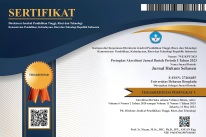Legal Consequences of the Decision of the Constitutional Court Number 18/Puuxvii/2029 on the Executional Power of the Notary Fiduciary Guarantee Deed
Abstract
According to the provisions of Article 30 of the UUJF, it is stated that the Fiduciary Giver is obliged to submit the object that is the object of the Fiduciary Guarantee in the context of carrying out the execution of the Fiduciary Guarantee. However, the execution must follow the procedure for implementing a court decision. This means that in accordance with Article 196 paragraph (3) of the HIR (Herzien Indonesia Regulation) the creditor must submit an application to the Head of the District Court to carry out the execution of the collateral object based on the executorial title of the Fiduciary Guarantee Certificate. The formulation of the problem in this research is the legal consequences of the decision of the constitutional court number 18/puuxvii/2029 on the executive power of a notary fiduciary guarantee deed? The type of research used is normative with a statutory approach and a decision study approach as well as a conceptual approach. The result of the research is that there is a Constitutional Court Decision, so the execution of fiduciary guarantees must follow the procedure for implementing a court decision. This means that in accordance with Article 196 paragraph (3) of the HIR (Herzien Indonesia Regulation), the creditor must submit an application to the Head of the District Court so that the execution of the collateral object is carried out based on the executorial title of the Fiduciary Guarantee Certificate. Fiduciary is the transfer of ownership rights to an object based on mutual trust based on the stipulation that the object whose ownership rights are transferred remains with the power that owns the object, as stated in Article 1 point 1 UUJF.
Downloads
Copyright (c) 2022 Ahmad Ardiansyah, Meysita Arum Nugroho

This work is licensed under a Creative Commons Attribution-ShareAlike 4.0 International License.






